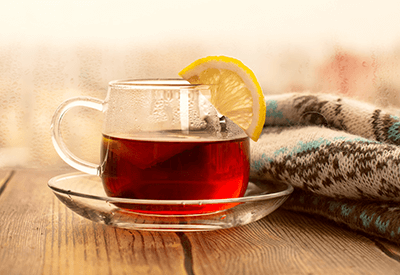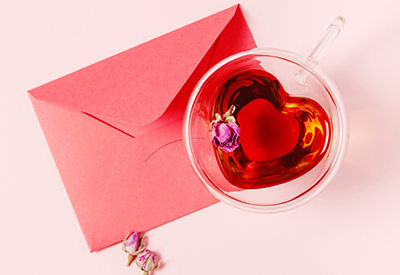Top 20 Types of Herbal Tea and Their Health Benefits
Top 20 Types of Herbal Tea and Their Health Benefits
Here is a list of the 20 best herbal teas you’ll want to try
-
Turmeric tea
Turmeric recently gained the label of a superfood, but you don't need to add it to smoothies to benefit from its nutritional value. A popular variety of herbal tea is turmeric tea. Turmeric root is used to create the vibrant orange turmeric powder that we are all familiar with. Similar to ginger, fresh turmeric can be cut into discs and steeped in hot water to make turmeric tea. Turmeric is known to offer multiple health benefits, including preventing and treating diabetes, cardiovascular disease, and numerous cancers and autoimmune diseases. -
Tulsi tea
Tulsi tea is often referred to as holy basil tea since it is prepared from the leaves of the holy basil plant which is native to Southeast Asia. It is historically significant and has an astringent, herby flavour. It's one of the essential herbs used in Ayurvedic medicine. Tulsi tea has been proven to be quite effective at reducing both mental and physical stress. Additionally, it’s believed to possess antibacterial qualities. -
Rosemary tea
If you love using rosemary for cooking, you will love a cup of rosemary tea as well. Rosemary is commonly used to flavour food in many different cuisines, but it also known to have several health benefits, from helping with Alzheimer’s disease to curing anxiety. Infused with water, rosemary has a pine-needle-like aroma that is fragrant, earthy, and fresh. -
Rosehip tea
Rose hips can be used to make a well-balanced herbal tea with a tangy aftertaste that is rich in vitamin C but not nearly as tart as hibiscus tea. It's best described as tangy and refreshing. Despite not being the most well-known or well-liked herbal tea, rosehip has some fantastic advantages. Rosehip tea has anti-inflammatory properties that may be especially helpful for treating arthritis. Rosehip is also associated with weight loss tea as it helps with achieving weight loss goals. -
Rose tea
Usually, dried rose plant flower petals are used to make rose tea. Rose tea contains a significant amount of vitamin C which helps strengthen the immune system and lower the risk of cancer. Rose petal-infused herbal teas are another excellent source of vitamin E which is good for maintaining the health of your skin. Rose tea has a strong, slightly sweet, and flowery flavour. It's generally blended with energised white tea or flavoured black tea; it would go particularly well with Coolingtea (Sheetal). -
Chamomile tea
One of the oldest and most popularly used medicinal plants is chamomile. Chamomile doesn't taste too floral, in contrast to many tisanes created from flowers. Instead, the flavour of this naturally sweet tea is hay and honey. Chamomile tea benefits have been linked to possible health advantages such as lowering anxiety, promoting sleep, and boosting the immune system. -
Cinnamon tea
Cinnamon is another ingredient in our Spicy Masala Chai. One of the most popular spices, it may also be found in a variety of winter-themed beverages, such as in our calming Stabilitea (Swasthyam). Cinnamon possesses qualities that make it a viable treatment for diabetics as well as a preventative treatment for neurological illnesses. -
Ashwagandha tea
Ashwagandha is an apoptogenic herb just like tulsi. Since ashwagandha's bitter and pungent flavour can be overpowering on its own, it is more frequently seen in herbal mixtures. The most common use is for the management of stress, anxiety, sleep issues and have many more benefits of ashwagandha tea. Studies have revealed that it protects the heart and brain, enhances memory, and even strengthens muscles. -
Peppermint tea
Peppermint is utilised all over the world because of its cooling and relaxing effects. This ea has a flavour that is refreshing and subtly sweet, which could help with foul breath. The most significant advantages are reducing stress, promoting healthy digestion and relaxing the stomach, strengthening the immune system, and easing typical cold symptoms. -
Barley tea
To create a toasty, warming flavour, roasted barley grains are infused with hot water to make barley tea. It is consumed not only in the West but also in many Asian nations. A barley infusion helps your body naturally remove toxins and enhance circulation because it contains a lot of antioxidant chemicals and increases blood fluidity. -
Gingko tea
Gingko has historically been used to address age-related issues with the brain. Interestingly, it’s one of the oldest trees in the world. One of the most often utilised herbal remedies for memory issues is gingko, despite the lack of sufficient scientific evidence to support its advantages. -
Sage tea
Sage is another herb that is more frequently used in cooking than in herbal teas. However, sage tea is beneficial and generally accessible in tea form. Its flavour is earthy, bitter, and herbaceous, and a tablespoon of honey or a piece of citrus fruit works best to mask it. Sage tea appears to boost lipid profiles and antioxidant defences. Sage has long been used as a treatment for menstrual cramps and reducing stomach pain, as well as for mental stimulation. -
Valerian root tea
Valerian is a well-liked herbal tea for improving the consistency and length of sleep, along with chamomile and passionflower. The tea made from valerian root has an earthy, almost spice-like flavour. Numerous studies have suggested that valerian root may be an effective sleep aid that doesn't have any unfavourable side effects. Magnesium and valerian are frequently combined in sleep aids. -
Rooibos tea
Rooibos has gained popularity among tea drinkers all over the world in recent years. The peculiar earthy and sweet flavour of this tea, which is only cultivated in South Africa, makes it ideal for combining with other herbs, fruits, or flowers. This tea is used for its flavour as well as for its strong antioxidant properties and a variety of potential health benefits, such as lowering cholesterol and blood pressure, alleviating infant colic, and improving lung airflow. -
Raspberry Leaf tea
One of the most well-liked herbal teas among women, especially pregnant women, is raspberry leaf tea. Many individuals think raspberry leaf can ease menstrual cramps, shorten labour pains and be helpful throughout pregnancy. If you are (or might be) pregnant, you should see your doctor before taking any herbal teas. -
Passionflower tea
The flavour of passionflower tea is slightly flowery, grassy, and earthy. Similar to chamomile and valerian, the main advantages of taking passionflower are its sedative and sleep-quality-improving properties. Interestingly, a double-blind study discovered normal-strength passionflower tea to be effective in enhancing sleep. -
Moringa tea
The leaves of the Moringa oleifera plant are steeped in water to create the herbal tea known as "moringa." Although this plant has incredibly fragrant flowers that are widely used in perfume and cosmetic goods, the leaves are what are normally utilised to make an infusion. Green tea and moringa share a similar fresh flavour, while moringa has a more earthy undertone. There's evidence that moringa has anti-fibrotic, anti-inflammatory, anti-microbial, anti-hyperglycaemic, antioxidant, anti-tumour, and anti-cancer properties. -
Liquorice tea
Liquorice root is the ideal food if you have a strong sweet tooth. Liquorice root when brewed yields a potent aniseed-flavoured beverage. Since before the Song dynasty in China, liquorice root has been used to heal sore throats, and recent studies have proved that liquorice possesses anti-inflammatory and immunoregulatory characteristics. -
Lavender tea
Lavender is most commonly used for relaxation, relieving anxiety, calming, and lifting mood. It blends well with other calming herbs such as chamomile. Lavender has advantages that include lowering anxiety when used as aromatherapy or in tea. -
Ginger tea
Everyone loves the spicy, comforting flavour of ginger tea. Effective ayurvedic remedies for constipation, menstruation and cold symptoms can be prepared using ginger. Strongly anti-inflammatory, it can help clear a stuffy nose, and its anti-nausea qualities can help calm an upset stomach. It's commonly combined with honey and lemon to make a mildly sweet and calming beverage. When you're sick, herbal drinks are a great way to stay hydrated. Herbal tea's therapeutic qualities are one of the factors contributing to its popularity. There are countless types of herbal teas, each with its flavours and advantages. Some ayurvedic herbs may taste better when combined, while others are delectable on their own. Some herbal teas do have an immediate and apparent effect, and herbal tea ingredients have been connected to a variety of herbal tea benefits. For instance, the menthol in peppermint tea will ease congestion, and ginger tea will lessen nausea. Enjoy these herbal teas for their flavour, but if you're interested in utilising them as a remedy, make sure to consult with a doctor first.
Frequently asked questions
-
What tea is good for anxiety?
Mint tea is the best for anxiety. Mint tea is believed to have a relaxing effect on the mind and body, helping you calm the mind, especially when tired and stressed out. -
What is the most beneficial herbal tea?
Green tea is best for overall health and is also an effective weight loss tea. It is full of polyphenols and antioxidants that help to boost brain and heart health. Green tea is considered one of the least processed true teas as it does not undergo oxidation. -
What is the healthiest tea?
Black tea will satisfy your need for caffeine in the morning without making you jittery or causing you to become overstimulated. Black tea has also proven pos


